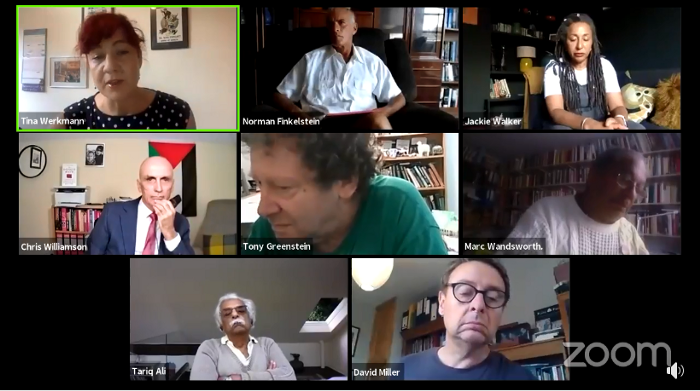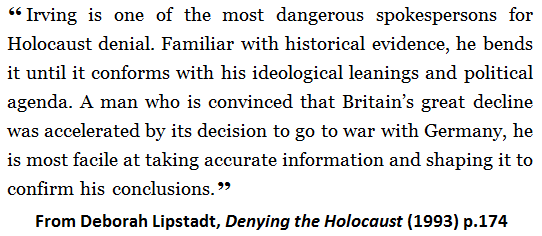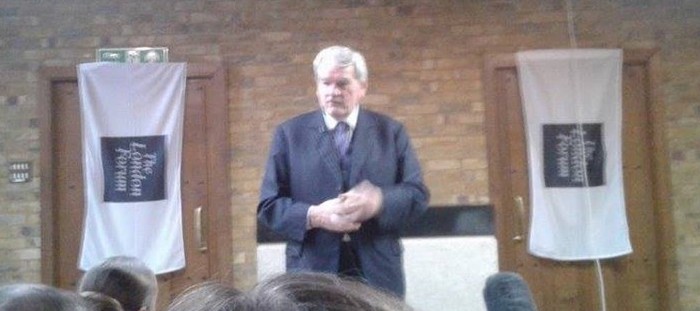The failings of Finkelstein

Norman Finkelstein has always been a loose cannon. His sometimes insightful political and historical analysis is invariably undermined by a contrarian urge to shock and provoke. When it comes to opposing Zionism and defending Palestinian rights, or repelling false and exaggerated accusations of antisemitism against the left, Norman’s support is often more of a hindrance than a help.
His performance last week at an online meeting hosted by Labour Against the Witchhunt, the purpose of which was to defend free speech in the face of a campaign to silence the left with false accusations of anti-Jewish racism, was a case in point. His comments proved highly controversial — as he no doubt intended — and resulted in a denunciatory article from Lee Harpin in the Jewish Chronicle titled “Norman Finkelstein praises Holocaust denier David Irving at pro-Corbyn group meeting”.

Finkelstein’s contribution to the meeting started well enough. It was the Zionist lobby who had taken the initiative in whipping up hysteria over Labour antisemitism, he argued, but the campaign had not been only, or even primarily, about Israel. It made the impact it did because it was taken up by wider reactionary forces intent on blocking the formation of a Corbyn-led Labour government that would pose a general threat to the political status quo. Finkelstein made that point very effectively, and it was a helpful corrective to the Zionist-conspiracy school of thought that sees the Labour antisemitism witch-hunt as being directed from Tel Aviv.
Unfortunately, it all went downhill from there. Finkelstein questioned whether it is antisemitic to describe Jews as killers of Christ, even though this has been an accusation favoured by antisemites for centuries, having inspired pogroms back in the Middle Ages. The issue of the number of victims who died in the Holocaust should be open to “statistical, scholarly questions”, he opined, despite this being the specious argument used by every Holocaust revisionist.
Worst of all, Finkelstein saw fit to mount a defence of David Irving — the Hitler-admiring, Nazi-sympathising writer who achieved international prominence twenty years ago over his libel case against US historian Deborah Lipstadt. “David Irving was a very good historian”, Finkelstein declared. “I don’t care what Richard Evans says, he was a very good historian. He produced works which are substantive…. He knew a thing or two. Actually he knew a thing or two or three.”
Irving launched his libel action against Lipstadt after she had attacked him in her book Denying the Holocaust, describing him as a leading figure in the Holocaust denial movement and accusing him of having falsified historical evidence in the service of his far-right politics. Irving rejected these charges and claimed that Lipstadt had defamed his reputation as a historian.

The Richard Evans to whom Finkelstein referred so dismissively was the expert on German history who appeared as a central witness for the defence at the trial. Evans thoroughly trashed Irving’s claims to be a serious historian and exposed his record of fraudulently manipulating historical evidence in line with his Nazi sympathies. Evans’ intervention was vital to Irving losing the case.
It is true that two other experts — John Keegan and Donald Cameron Watt — who were called by Irving to give evidence at the trial did testify to his competence as a historian in the field of military history. But they gave no support at all to Irving’s views on the Holocaust or his apologetics for Hitler.
 The defence by some experts of some of Irving’s work has long been used by Finkelstein to present Irving in a positive light as a historian. In his book The Holocaust Industry, published in 2000, Finkelstein wrote: “Irving, notorious as an admirer of Hitler and sympathizer with German national socialism, has nevertheless, as Gordon Craig points out, made an ‘indispensable’ contribution to our knowledge of World War II.”
The defence by some experts of some of Irving’s work has long been used by Finkelstein to present Irving in a positive light as a historian. In his book The Holocaust Industry, published in 2000, Finkelstein wrote: “Irving, notorious as an admirer of Hitler and sympathizer with German national socialism, has nevertheless, as Gordon Craig points out, made an ‘indispensable’ contribution to our knowledge of World War II.”
In a supporting footnote he quoted Gordon Craig preaching the virtues of Irving’s book Hitler’s War — which is notorious for its claim that Hitler was not responsible for, and indeed had no knowledge of the Holocaust — as follows: “His book Hitler’s War … remains the best study we have of the German side of the Second World War and, as such, indispensable for all students of that conflict…. Such people as David Irving, then, have an indispensable part in the historical enterprise, and we dare not disregard their views.”
In fact Craig’s assessment of Irving was rather less adulatory than it appeared from Finkelstein’s abbreviated version. What Craig actually wrote about Irving was that “his book Hitler’s War — despite its attempts to protect Hitler from any responsibility for the Holocaust and its implied argument that the Führer might well have won the war if his generals had only been intelligent enough to appreciate and exploit his military genius — remains the best study we have of the German side of the Second World War”. Finkelstein edited out the damning critical comments.
Finkelstein came under fire over this at the time. “He tells us the Nazi historian David Irving has made an ‘indispensable’ contribution to our knowledge of the Second World War”, an appalled Mike Simons wrote in Socialist Review. “This is the David Irving who sees himself as the intellectual leader of Europe’s new Nazis, and who was shown during his recent libel trial to be a systematic falsifier of history.”
Finkelstein’s defence then was that he was no authority on military history and therefore not in a position to offer a personal judgement on Irving’s merits as a historian. All he had done, he claimed, was draw attention to the fact that there were prominent historians with expertise in that area who saw considerable value in Irving’s work. (See his comments during a 2005 Q&A session at Yale University.)
Going by his contribution at last week’s meeting, Finkelstein is no longer using that excuse. Now he openly expresses his personal opinion that Irving was “a very good historian”, without even the qualification that Irving’s abilities were restricted to the field of military history, and he scornfully rejects the arguments of the man who played a leading role in exposing Irving as a Nazi-supporting charlatan.
None of this means that Finkelstein has any political sympathies with the fascist Irving, of course. So why does he spout such offensive nonsense?
His supporters argue that Finkelstein’s comments should be understood in the context of his commitment to the principle of free speech. Certainly he does appear to hold an absolutist position on this issue, as indeed do many people in the US from across the political spectrum, taking their inspiration from the First Amendment. Fellow leftist Noam Chomsky, for example, caused a major row four decades ago with his advocacy of free speech for Robert Faurisson, a French Holocaust denier with links to neo-Nazi groups.
Defending far-right propagandists’ right to free expression is a problem in itself. Irving’s writings on the Holocaust and Hitler were not abstract theoretical contributions to an academic debate. Their function was to provide practical assistance to modern day fascist organisations whose efforts to win wider popular support were obstructed by their association with the Nazis.
By disputing the reality of the Holocaust and providing an alibi for Hitler, and insisting that these are legitimate questions that are up for discussion, Irving sought to advance the neo-Nazis’ political prospects by detoxifying their poisonous political heritage. Because of this, Irving — who remains active and influential in far-right circles — deserves to be censored and no-platformed like any other fascist.

However, even if Finkelstein were correct in defending fascists’ right to free speech, that wouldn’t require him to accompany this defence with favourable remarks about them. He could just have said that Irving is entitled to publish his books and speak in support of his vile political views, because freedom of expression should be extended to all viewpoints however repellent, and that Irving’s false analysis should be refuted by argument not by bans. But Finkelstein didn’t do that. Instead he chose to pay a gratuitous tribute to Irving’s qualities as a historian.
It seems that Finkelstein suffers from a sort of intellectual coprolalia. He just can’t stop himself coming out with offensive statements that cause outrage among his opponents and political embarrassment to his allies. He appears to revel in the notoriety this generates.
 To take another example, two years ago Finkelstein wrote an article titled “The chimera of British anti-Semitism (and how not to fight it if it were real)” in which he took issue with a survey by the Institute for Jewish Policy Research. JPR had found a degree of popular support for various antisemitic stereotypes, one of which was the belief that “Jews have too much power in Britain”.
To take another example, two years ago Finkelstein wrote an article titled “The chimera of British anti-Semitism (and how not to fight it if it were real)” in which he took issue with a survey by the Institute for Jewish Policy Research. JPR had found a degree of popular support for various antisemitic stereotypes, one of which was the belief that “Jews have too much power in Britain”.
Finkelstein’s response was that such stereotypes, far from being the result of ignorant prejudice, were in fact firmly rooted in reality. He pointed to the wealth and political influence of Jewish individuals and organisations in the UK, and asked: “Is it anti-Semitism to believe that ‘Jews have too much power in Britain’ — or is it just plain common sense?”
The frustrating thing is that, at his best, Finkelstein is capable of making a persuasive case against the misuse of antisemitism accusations. In May 2016, following Labour’s suspension of Naz Shah MP (in part for sharing a meme that she probably got from Finkelstein’s website) and then of Ken Livingstone for defending her, Finkelstein was interviewed by Jamie Stern-Weiner for Open Democracy. He made a number of thoughtful and informed observations about Labour’s emerging antisemitism crisis (even if he couldn’t resist a swipe at Richard Evans). But then he goes and ruins it all by publishing an inflammatory justification of the use of antisemitic stereotypes.
In short, Finkelstein is a contradictory figure, whose presence on progressive platforms has the potential to seriously backfire. For that reason, when I was working in the Mayor of London’s office back in the noughties, I argued against Finkelstein being invited to speak at a conference we were organising. I pointed out that although his then recently-published book Beyond Chutzpah contained a useful critique of the so-called “new antisemitism”, his better-known The Holocaust Industry had opposed all existing forms of Shoah commemoration on the grounds that they served the aims of pro-Israel propaganda and “Jewish aggrandisement”. I said that was an untenable position and it would be politically damaging for the Mayor to be associated with such views.
If Finkelstein is invited to speak at leftwing meetings, his hosts need to be aware that he is liable to cause problems and other speakers should be primed to challenge him if he does. To be fair, at the Campaign for Free Speech meeting Tony Greenstein did point out in reply to Finkelstein that it is “clearly antisemitic” to describe Jews as Christ killers and that, while Irving might be a historian, “his politics have got in the way of his history and his research and he certainly did tamper with sources, from my reading of the transcripts of the Irving trial”. But Tony was the only one to raise any criticism of Finkelstein’s comments.
The result was that, thanks to Finkelstein’s irresponsible and self-indulgent behaviour, a meeting called to oppose the Labour antisemitism witch-hunt ended up actually providing ammunition for the witch-hunters. Some lessons surely need to be learned from this.
Published on Medium in August 2020